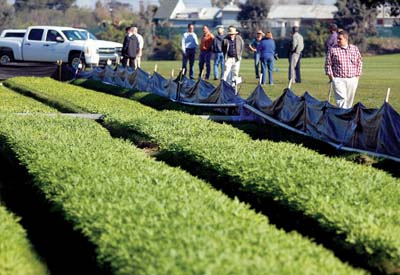
Hoping to help meet some of the future irrigation needs of
growers, San Benito County Water District officials last week
showed off a lettuce and spinach demonstration garden grown with
water reclaimed from Hollister’s wastewater treatment plant.
Hoping to help meet some of the future irrigation needs of growers, San Benito County Water District officials last week showed off a lettuce and spinach demonstration garden grown with water reclaimed from Hollister’s wastewater treatment plant.
With agricultural water deliveries from the Central Valley Project lower than historical levels and not projected to increase, “recycled” water like that used on the test garden could add up to 4,000 acre-feet of water to the region’s water supply. An acre-foot equals 325,851 gallons of water.
The meeting, which featured local growers, elected officials and water district personnel, was held at the city’s river park site, a 50-acre grassy park on the west end of the San Juan Hwy. bridge.
“This really can work and is something that we’d like to move forward with,” said Jeff Cattaneo, head of the county water district. “We’ve heard from growers. They had some concern [about irrigating with water recycled from the treatment plan] and they wanted assurance it was a viable water supply.”
To assuage some of those concerns, the water district planted a 25-foot by 250-foot garden of Missoula lettuce and baby spinach on October 9 and has been doing weekly water-quality monitoring for general minerals and pathogens such as e-coli, shigella and salmonella. They have also analyzed the soil and plan to sample the plant tissue at the end of its growing cycle.
As of the Nov. 19 meeting, all water tests for pathogens had come up negative, indicating the water was safe to use, officials said.
“We wanted to help assure you that the water would be pathogen-free,” Cattaneo told the assembled growers. “All tests have come back negative and there have been no issues at all.”
The district is seeking input from growers about what information they need in order “to feel comfortable with the product,” Cattaneo said, noting that no soil amendments, fertilizers or pesticides were used in the demonstration garden, which is on the northern edge of the Brigantino/Riverside Park Project. Testing on the soil will continue as long as the city is irrigating the plot and Natural Selection Foods will test the greens at some point.
See the Pinnacle for the full story.









